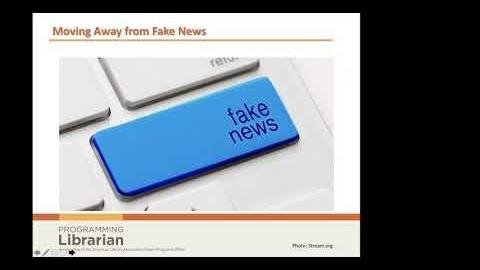Introduction
In this article by Programming Librarian, Samantha Oakley from the Public Programs Office introduces a webinar on media literacy for adults. The webinar focuses on the topics of misinformation and disinformation in the digital age. Oakley reminds participants of the technical aspects of the webinar and informs them that the session will be recorded for future reference. She also mentions the practitioner’s guide on media literacy in libraries and introduces the presenter, Dr. Nicole Cook.
Meet the Presenter: Dr. Nicole Cook
Dr. Nicole Cook is the Augusta Baker Endowed Chair and Associate Professor at the School of Information and Library Science at the University of South Carolina. She is an expert in human information behavior, fake news consumption, and critical cultural information studies. Dr. Cook has been recognized for her work in combating online hate and promoting social justice in libraries. She is the recipient of several awards for her contributions to the field, including the ALA Equality Award and the Martin Luther King Jr. Social Justice Award.
Understanding Misinformation and Disinformation
Dr. Nicole Cook begins her presentation by expressing her gratitude to Samantha Oakley and the Public Programs Office for the opportunity to share valuable information on misinformation and disinformation. She emphasizes the need for open-mindedness in understanding different perspectives and evaluating information critically. Dr. Cook discusses how fake news, misinformation, and disinformation pose challenges for both information professionals and the general public. She highlights the importance of media literacy education and the role that libraries can play in providing resources and strategies to combat the spread of false information.
The Fluidity of Language: Moving Away from “Fake News”
Dr. Cook suggests moving away from the term “fake news” as it has become polarized and politicized. She explains that misinformation refers to false information that can be unintentionally spread, while disinformation involves the deliberate creation and dissemination of false information with the intent to mislead. She provides examples of visual disinformation and introduces the concept of deep fakes, which use artificial intelligence to alter video content. Dr. Cook also mentions the third category, malinformation, which involves false information intended to harm or mislead.
The Challenge of the Political Economy
Dr. Cook discusses the political economy of information, where misinformation and disinformation can be used for financial gain through ad clicks and content creation. She mentions the existence of bad actors involved in creating and spreading fake news. Dr. Cook also highlights the problem of filter bubbles and echo chambers on social media platforms, which can limit exposure to diverse perspectives. She encourages information professionals to overcome biases and engage with different sources to obtain a more balanced understanding of information.
Psychology, Information Literacy, and Meta-Literacy
Dr. Cook addresses the psychological factors involved in misinformation and disinformation, highlighting the role of emotions and biases in information consumption. She emphasizes the importance of information literacy and the skills of fact-checking, lateral reading, and critical thinking. Dr. Cook introduces the concept of meta-literacy, which involves thinking broadly across disciplines to understand and critically evaluate information.
Recommendations and Resources
Dr. Cook concludes her presentation by recommending books and resources for further learning on the topics of misinformation and disinformation. She encourages information professionals to stay open-minded, engage in ongoing learning, and promote civil discourse when discussing these issues with community members.
Q&A Session
During the Q&A session, participants raise questions about terminology, the use of specific terms like “fake news,” and recommendations on effective communication strategies. Dr. Cook provides insights and suggestions, emphasizing the need to consider context and audience when choosing terminology. She also encourages librarians to use terms like “misinformation” and “disinformation” in their communication with the public.
In conclusion, Dr. Nicole Cook’s presentation on media literacy for adults sheds light on the challenges posed by misinformation and disinformation. She emphasizes the importance of critical thinking, information evaluation, and open-mindedness in combatting false information. The presentation provides valuable insights and resources for information professionals to navigate the complex landscape of media literacy.
Disclaimer: The video content displayed above was created and is the property of Programming Librarian. We do not claim any rights to this content and are not in any way endorsing or affiliated with the creators. This video is embedded here for informational/entertainment purposes only. The accompanying articles, although sometimes narrated in the first person, are independently written by our editorial team and do not necessarily reflect the views or expressions of the video creators.





